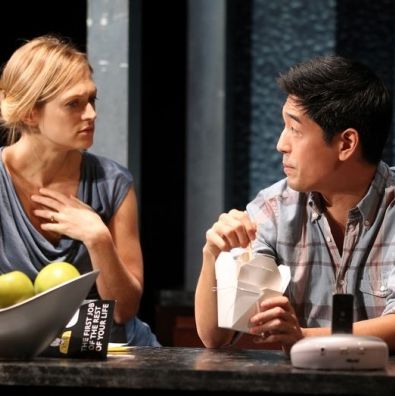
Richard II (at City Center’s Stage II through December 24)
The tiny Pearl Theatre Company’s productions (classics, served straight-up, without a twist) may look rag-sourced from a local high school, but damned if they don’t always contain at least one and often several performances of dazzling quality. Sean McNall, the Pearl’s secret weapon, was born to play Richard II, Shakespeare’s most complex monarch, a divinely entitled royal sociopath transformed, by the very earthly banalities of politics and money, into a true philosopher, glorious in defeat. (Just like some boyfriends make better ex-boyfriends, Richard makes a better ex-king.) McNall, whose tiny stature and collectible physique give him the appearance of some all-too-breakable heirloom, takes Richard’s famous preening and fate-bewailing (“For God’s sake, let us sit upon the ground / and tell sad stories of the death of kings!”) beyond rhetoric, beyond the merely “Shakespearean” and into Real Effin’ Shakespeare. Under his command, the failing monarch’s matchless poetry (even the great Henry V, at his most lyrically introspective, can’t touch him) becomes a serious inquiry submitted to an unjust Creator. Richard is deposed by Bolingbroke, a.k.a. Henry IV (Grant Goodman), but Richard goes one better: He deposes God, that old fraud, the supposed guarantor of kingship. McNall’s formal discipline is matched only by his honest humanity. He makes our hearts break for a crook, an embezzler, an amoral tyrant. He relinquishes earth/realm/England to become conqueror of Himself: Dump me, Albion? Not before I dump you! McNall’s Richard makes solipsism look heroic. Goldman-Sachs: Hire this man.
Maple & Vine (at Playwrights Horizons through December 23)
Jordan Harrison’s merry Stepford comedy takes a neurotic modern married couple (Marin Ireland and Peter Kim), both souring on the many irritations of 21st century life, into a carefully stage-managed Potemkin village of America’s fifties past. Most folks just flip on Mad Men: Katha and Ryu, recovering from a miscarriage, go whole hog, decamping from the city to join a cult of fedora-wearing Luddites. Welcoming them are an apple-cheeked horror named Dean (Trent Dawson) and his imperiously unhappy wife Ellen (Jeanine Serralles), who encourage Katha to embrace housewifery and Ryu second-class citizenship. (Mixed-race couples, the period players explain, would be subject to hostility in the fifties — it’s only natural, and they’ll come to enjoy it.) Lurking in the shadows is a hunky Brando-esque wild card named Roger (Pedro Pascal), who’s Exactly What You Think He Is. At its best, Maple & Vine is nifty, witty, sexy “cosplay”; nostalgia as an elaborate sex game for young post-millennial marrieds hitting their midlife crises a bit early. At its worst, the play is both laborious and obvious. Harrison makes the walls of his metaphor a little too concrete and literal, and there’s no ventilation, and director Anne Kauffman, while keeping a firm hand on the tiller, lets in no refreshing draught of anarchy. Harrison flirts with an interesting kind of fetishism here, but his show is ultimately too delicate to embrace it: Too often, it coasts on easy Ozzie-and-Harriet jokes and well-trod cultural-studies nostrums. What it actually has to say about our willed embrace of a nonexistent Golden Age gets upstaged by the loud wallpaper of its own conceit. But Ireland and Serralles bring two unique flavors of madness and dissatisfaction into the room, and it’s fun watching both of them teetering on the edge of two very different abysses. There’s a lot of peril onstage, some of it owed to Alexander Dodge’s vividly imagined by extremely cumbersome set, a thorny palisade of Technicolor door frames and suggested rooms that whoosh in and out, up and down. The crew gets a curtain call, and deserves it.
Neighbourhood Watch (at 59E59 through January 1)
Sir Alan Ayckbourn’s 75th (!) play takes on Britain’s “ring of steel” police state with trademark affability: Even when engaging subjects as inflammatory as middle-class racism, classism, and fear, he can’t help but be comforting. Sweet Martin (Matthew Cottle), a 40-year-old-virgin type, and his sexually petrified sister Hilda (Alexandra Mathie) — devout Christians both — move to the bourgie Bluebell Hill development and quickly find themselves heading a reactionary movement against the adjacent council estate (i.e., housing project). Soon, the stocks are built on the roundabout, a razor-wire fence has been erected, and a familiar modern fearocracy is declared. Yet the laughs are gentle and the characters familiar: There’s the old ex-soldier (a very funny Terence Booth) who makes a natural Gestapo; the scarlet woman (Frances Grey) who tempts the Great Leader; and the cuckolded hubby (Richard Derrington), who’s all too eager to channel his rage into the Cause. There’s also a garden statuette of Jesus, waiting patiently as Chekhov’s gun for the crisis-climax. The exceedingly mild pleasures of Neighbourhood Watch don’t lie in the story — which pulls as many punches as it lands, and cocks a lot of pistols it never sets off — but in the near-subversive sociability of its leads, especially Cottle and Mathie: They’re the most genial fascists you’ve ever spent an evening with. (Only Mathie’s Hilda displays, in her steely eye and jutted jaw, her inner authoritarian, and the playwright’s implied rationale for her mettle is, to put it nicely, a little antiquated, perhaps even slightly offensive.) Even Ayckbourn seems charmed and perhaps a bit lulled by them. Prepare for a soothingly un-revolutionary evening. Some comedies are for rattling cages, some for lining them, and the world’s big enough for both. No sense going to war over it.




